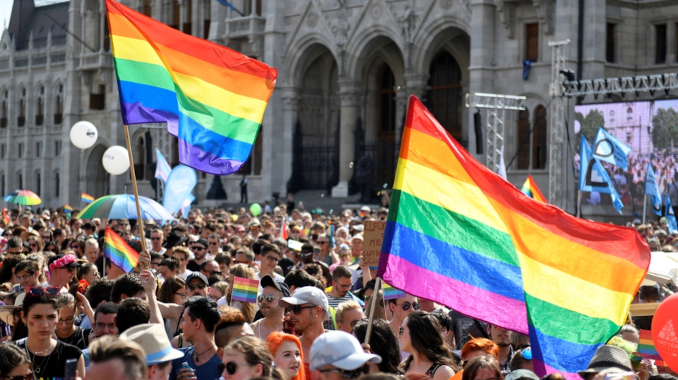
By Mark Anderson
“Nature, to be commanded, must be obeyed,” wrote Francis Bacon, making a sound philosophical statement that the English statesman likely never realized would constitute an obstacle against those who promote “modernity.”
Click the Link Below to Listen to the Audio of this Article
Modernity is a media-promoted, education-sanctioned worldview that denies there’s an objective reality and therefore flouts the natural order. Hyper-modernists push decadence, anything-goes ethics and hyper-individualism while often denigrating tradition and, specifically, the Christian moral order.
Accordingly, modernity undergirds the belief that there’s no such thing as age-inappropriate children’s literature. Therefore, books on LGBTQ+ issues, even books that explicitly describe sexual acts and “exploration” involving minors and children, should, with few if any questions, be displayed in tax-funded community libraries and in the tax-supported libraries set up within the public schools at the elementary, middle and high school levels.
‘BOOK-BANNING’ CONTROVERSIES
In Prattville, Ala., a local mother, Heather Mann Rees, sparked a challenge against apparently illicit children’s books on display at the local library. “For the past several months, a growing number of Prattville residents have been calling for the Autauga-Prattville Public Library (APPL) and the Prattville City Council to remove certain books with LGBTQ+ content,” the news and commentary website “Alabama Political Reporter” (APR) noted on May 30. “It all started with The Pronoun Book.”
Another local mother allowed her son to check out that book, assuming it focused on basic grammar. But come to find out, the book indoctrinates children with the subjective view that “he” and “she” are interchangeable terms. One might call a woman who “self-identifies” as a man a “he” and vice-versa.
While the book mainly consists of illustrations, it opens by asking: “How do you know what someone wants to be called?” The answer continues on the next page: “Ask.” The book shows illustrations of different people who could be called “he” or “she,” irrespective of their actual anatomy.
Rees and other parents identified six books to immediately submit to the library authorities for reconsideration, with an estimated 80 books in all being reviewed for content by the parents’ group. The books in question are all about youth sexuality, whereas in other U.S. communities, some popular classics such as The Great Gatsby and Charlotte’s Web have been under banning threats.
The six books in the initial Alabama complaint, besides The Pronoun Book, include: Yes! No!, a children’s book on sexual consent; Bye Bye, Binary, a children’s book on gender expression; Calvin, a children’s story about a girl who identifies as a boy; Being You: A First Conversation About Gender; and Alice Austen Lived Here, a book for ages 12-14 about a non-binary teen exploring “identity.”
Starting the challenge at the library itself, Rees met with APPL director Lindsey Milam, who disagreed with Rees and the other parents. Rees was quoted by APR as saying: “I told her about why this is biblically wrong and listed off various scientific evidence and reading I had done on why these books were completely inappropriate for children.” But Milam said that “not all parents feel the same way,” and refused to move the books off the public shelves—nor would she move them behind the circulation desk.
After filling out a “reconsideration of materials” form, Rees achieved limited results with the Library Board. So, the City Council that funds the library and oversees the Library Board was the next step.
At her first council meeting in May, Rees spoke publicly for the first time. The six books being presented are “filled with false ideas about gender, and force children into inappropriate conversations about sexuality,” she stated.
And while parent Matthew Clark, president of the Alabama Center for Law and Liberty, suggested several options—saying the City Council has the authority to have the books sequestered in their own section, or pass a resolution to “declare these things a public nuisance and order their abatement”—the council had largely agreed at press time not to exercise its authority.
Meanwhile, Angie Hayden, who has a gay son and opposes the parents’ group, complained that “a small vocal minority” is trying to censor the library’s offerings.
Really? Or is the LGBTQ+ community the actual “vocal minority” with the parents’ group representing the majority?
To think this radical vocal minority has energized the tax dollars of communities across the nation—from New Jersey, South Carolina, Texas and Florida to Missouri, Utah and a few other states where “book-banning” controversies are flaring—to push the books of publishers whose products are sexualizing children.
The repetitive tactic, of course, is to play the victim and project your misdeeds onto your opponent in order to mask a cultural offensive against traditional values in places like Alabama within the Bible Belt.
Mark Anderson is AFP’s roving editor. He invites your thoughtful comments and story ideas at [email protected]. Mark’s radio show “Stop the Presses!” runs at www.republicbroadcasting.org, Wednesdays from 3 to 4 p.m.






Paedophile Paedophile Sodomite cultural dominance county…